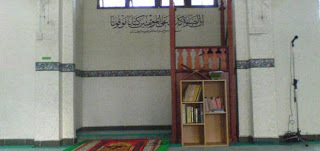The month of Rabi’ul Awwal came by and has passed us. But let us keep the presence of our beloved Prophet Muhammad sallallahu ‘alaihi wasallam fresh in every quantum of light that our eyes receive. And keep his spiritual essence alive in every breath we take.
Don't you find it strange that some people (loudly claiming they are "purer" Muslims) look for excuses to not celebrate the prophet (saw) and critize fellow muslims who do celebrate? Get real! All Muslims should to celebrate Prophet Muhammad (saw), as had been done by the salaf and khalaf generations before us.
Part of Burdah of Imam Muhammad bin Said al-Busiri
As long as you do not follow the way of the Christians
- who overly praise Jesus alaihissalam and turn him into god)-
Praise him (Muhammad) the way you please(verse 43)
Salawat Khusus of Tariqah Ahmadiah
O Allah, send salutation, peace and blessings upon our master Muhammad and his family in every glance and breath, the count of which only known to Allah, whose Knowledge has no limit.
Part of Salawat ‘Azimiah of Sidi Ahmad bin Idris (rh)
I plea to Allah - by the Light of Allah the Magnificent, the Light that fills up the Pillars of the ‘Arash of Allah the Magnificent, with which the worlds come into being – that He send great salutation upon our master Muhammad. And great salutation upon the family of Nabi, a salutation fitting to the greatness of Allah......(until the end)
Salawat of Imam as-Shafi’i (rh) as found in Dala’il al-Khairat and elsewhere
O Allah, send salutation and peace upon Sayyidina Muhammad, every time those who remember (az-zakirun) make remembrance (zakara) of You.
O Allah, send salutation and peace upon Sayyidina Muhammad, every time those who neglect (al-ghafilun) fail to make remembrance of you.
Part of the Ten Salawaat as given by a student of Madrasah Saulatiyyah, Makkah
O Allah, send salutation and peace upon Sayyidina Muhammad, who walks under the sun and he has no shadow following him.
O Allah, send salutation and peace upon Sayyidina Muhammad, (so noble he is) that flies never set down on his person...(until the end)
Part of Dala'il al-Khairat as read on Saturdays
And may You (Allah) send salutation upon him (Muhammad) and his family. Send salutations as many times as the number of the creations - who glorify You, and who claim Holiness unto You, and who prostrate to You - since the the day you created this world up to the Day of Resurrection, and for each day you amplify 1000 fold...(until the end)
Salawat Shifa/Tibbiah
O Allah, send salutation upon Sayyidina Muhammad, the kind that cleanses the heart and becomes its healer, that remedies ailment and becomes health restorer, that lights up vision and becomes the illuminator.
Salawat Tafrijiyah
O Allah, send complete salutation and send perfect peace upon Sayyidina Muhammad, with whom ceases all that binds, and ends all sadness, and fulfills all wishes, and attains all desires, and ends with goodness, and causes the pouring of rain, by his generous countenance, and upon his family and his companions, as much as glance of an eye and every breath that is made that is in Your Knowledge.
Salawat Munjiyat
O Allah, send salutation upon Sayyidina Muhammad, with which You release us from catastrophe and misfortune, and You fulfill all wishes, and You clear all our wrongdoings, and You elevate our rank by Your side, and You suffice us with kindness during our lifetime and after it, and please send our salutation as well to Muhammad’s family and his companions.
Some translations I took from these sites, thanks to the owners:
http://superdervish.blogspot.com/2006/05/salawat-nariyyahtafrijiyyah.html
http://al4mien.wordpress.com/category/dienul-islam/page/2/
http://www.deenislam.co.uk/dalail.htm
http://bewley.virtualave.net/dalail1.html
Don't you find it strange that some people (loudly claiming they are "purer" Muslims) look for excuses to not celebrate the prophet (saw) and critize fellow muslims who do celebrate? Get real! All Muslims should to celebrate Prophet Muhammad (saw), as had been done by the salaf and khalaf generations before us.
Part of Burdah of Imam Muhammad bin Said al-Busiri
As long as you do not follow the way of the Christians
- who overly praise Jesus alaihissalam and turn him into god)-
Praise him (Muhammad) the way you please(verse 43)
Salawat Khusus of Tariqah Ahmadiah
O Allah, send salutation, peace and blessings upon our master Muhammad and his family in every glance and breath, the count of which only known to Allah, whose Knowledge has no limit.
Part of Salawat ‘Azimiah of Sidi Ahmad bin Idris (rh)
I plea to Allah - by the Light of Allah the Magnificent, the Light that fills up the Pillars of the ‘Arash of Allah the Magnificent, with which the worlds come into being – that He send great salutation upon our master Muhammad. And great salutation upon the family of Nabi, a salutation fitting to the greatness of Allah......(until the end)
Salawat of Imam as-Shafi’i (rh) as found in Dala’il al-Khairat and elsewhere
O Allah, send salutation and peace upon Sayyidina Muhammad, every time those who remember (az-zakirun) make remembrance (zakara) of You.
O Allah, send salutation and peace upon Sayyidina Muhammad, every time those who neglect (al-ghafilun) fail to make remembrance of you.
Part of the Ten Salawaat as given by a student of Madrasah Saulatiyyah, Makkah
O Allah, send salutation and peace upon Sayyidina Muhammad, who walks under the sun and he has no shadow following him.
O Allah, send salutation and peace upon Sayyidina Muhammad, (so noble he is) that flies never set down on his person...(until the end)
Part of Dala'il al-Khairat as read on Saturdays
And may You (Allah) send salutation upon him (Muhammad) and his family. Send salutations as many times as the number of the creations - who glorify You, and who claim Holiness unto You, and who prostrate to You - since the the day you created this world up to the Day of Resurrection, and for each day you amplify 1000 fold...(until the end)
Salawat Shifa/Tibbiah
O Allah, send salutation upon Sayyidina Muhammad, the kind that cleanses the heart and becomes its healer, that remedies ailment and becomes health restorer, that lights up vision and becomes the illuminator.
Salawat Tafrijiyah
O Allah, send complete salutation and send perfect peace upon Sayyidina Muhammad, with whom ceases all that binds, and ends all sadness, and fulfills all wishes, and attains all desires, and ends with goodness, and causes the pouring of rain, by his generous countenance, and upon his family and his companions, as much as glance of an eye and every breath that is made that is in Your Knowledge.
Salawat Munjiyat
O Allah, send salutation upon Sayyidina Muhammad, with which You release us from catastrophe and misfortune, and You fulfill all wishes, and You clear all our wrongdoings, and You elevate our rank by Your side, and You suffice us with kindness during our lifetime and after it, and please send our salutation as well to Muhammad’s family and his companions.
Some translations I took from these sites, thanks to the owners:
http://superdervish.blogspot.com/2006/05/salawat-nariyyahtafrijiyyah.html
http://al4mien.wordpress.com/category/dienul-islam/page/2/
http://www.deenislam.co.uk/dalail.htm
http://bewley.virtualave.net/dalail1.html
Wallahu a'lam


 Darul Uluoom Deoband
Darul Uluoom Deoband  If you happen to be in Langkawi, look for Imam Mohammed Khaled of Masjid India (Riadhul ‘Abidin) in Kuah town. Make a visit to this man, maybe there is something good Allah will bestow you.
If you happen to be in Langkawi, look for Imam Mohammed Khaled of Masjid India (Riadhul ‘Abidin) in Kuah town. Make a visit to this man, maybe there is something good Allah will bestow you. 


